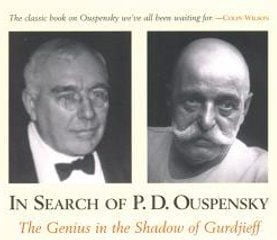When a great mathematician, P. D. Ouspensky, went to see a very strange mystic, George Gurdjieff, Ouspensky was already world-famous, and Gurdjieff was not known at all; nobody had heard about him. Ouspensky had already written one of the greatest books in the world, TERTIUM ORGANUM. It is said that there are only three great books in the world: the first was written by Aristotle, Organum, and the second was written by Bacon, NOVUM ORGANUM, and the third was written by P. D. Ouspensky, TERTIUM ORGANUM. First principle, second principle, third principle — third canon of thought, that is the meaning of Tertium Organum
Ouspensky declared in the beginning of the book that the third existed even before the first ever existed. And it is NOT just pride, it is not just ego — it is true. He had discovered something of immense value; he had contributed to the world of mathematics, logic, metaphysics, something really valuable. He was known all over the world; the book was being translated into many many languages.
And Gurdjieff was not known at all — just a small group of people knew about him. And it was not easy to approach him either; he was not available publicly. Ouspensky had great difficulties and had to wait three months to see him and had to try many people because only those who belonged to the inner circle of Gurdjieff were allowed to bring some new guest.
And the day he was ushered into the presence of Gurdjieff, twelve people were sitting there. Gurdjieff in the middle and all the twelve surrounding him, and there was absolute silence. And the man who had brought Ouspensky, he also sat there and closed his eyes.
Now, Ouspensky started feeling very restless; he was not even introduced. He started feeling a little embarrassed too: “What is he doing here? And what are these people doing here, just sitting silently?”
Half an hour passed… and now it was almost one hour passing. Ouspensky started thinking, “What am I sitting here for?” But he could not even leave, because it looked so impolite to disturb the silence. The silence was so tangible, like a cloud the silence was sitting there.
And then Gurdjieff looked at Ouspensky, and he said, “You are feeling very restless. It is natural — you come from a restless world; you don’t know the ways of silence. Why did you want to see me? Why have you been haunting me for three months?”
Gurdjieff called Ouspensky to come close so he could see into his eyes. And Ouspensky said, ”I have never seen such eyes, and I have never felt so nervous – almost on the point of breakdown. And that man’s eyes were penetrating to the very deepest core of my being, like swords.”
And Ouspensky said, “I wanted to ask you a few questions.” Gurdjieff gave him a blank sheet of paper and told him, “Go into the other room and on the one side write whatsoever you know, and on the other side whatsoever you don’t know. And then come back — because I will answer only that which you don’t know. If you already know it, why bother about it?”
It was a cold Moscow night, the snow was falling, and Ouspensky remembers, “Going into the other room, I started perspiring. For the first time, with such emphasis, I was made aware that I know nothing. I wanted to write something, just to save my prestige, that I know this, that. I thought it over, round and round, but basically I knew nothing. I thought: Do I know anything about love? I have heard much, I have read much — but any experience? because that man is not going to let it pass easily. He will ask, ‘Any experience?’ ” And he had seen those eyes which can go to the very core of your being: “You cannot deceive that man.
“Do I know anything about meditation? Do I know anything about God? Do I know anything of any real significance?”
He waited and waited and he could not find anything. And finally he came out and gave the paper back — as blank as before — and said, “Excuse me, I don’t know anything. I know nothing. I have been a fool up to now. I had always believed that I knew this and I knew that. You have shattered me in a single blow.”
Gurdjieff looked at Ouspensky, and his eyes were those of benediction. He said, “Then you are accepted — because only those who know that they know not can be accepted in my circle, because only they are capable of learning.”
Start from the state of not knowing and you will become capable of knowing. Start from the clean slate and let God write something on it. Efface all that you know. Before God, be just nude, innocent, ignorant, a child. And YOU WILL know. We are here to know, but that knowing does not come through scriptures, that knowing comes through silence. And the knowledgeable mind cannot be silent. It is so full of knowledge, so full of thoughts, it cannot empty itself.
Empty yourself. Empty yourself of all knowledge, dreams and desires. Throw all this rotten furniture out of yourself. Create a pure space, and in that pure space you become capable of attracting the ultimate towards you; you become a magnetic force.
You become the host, and God comes as a guest.
Osho: The Fish in the Sea is Not Thirsty Chapter #6 Chapter title: Untimely Sannyasination Q 3
चलो अच्छा हुआ काम आ गई दीवानगी अपनी
वरना हम ज़माने भर को समझाने कहाँ जाते…………………….. क़तील शिफ़ाई
chalo achchhā huā kaam aa ga.ī dīvāngī apnī
varna ham zamāne bhar ko samjhāne kahāñ jaate ……………………..Qateel Shifai
“It’s good that my madness came in handy,
Otherwise, where would I go to explain myself to the entire world?”
While reading the conversation between P.D. Ouspensky and George Gurdjieff, a phenomenal song by Javed Akhtar and R.D. Burman, sung by Kumar Sanu, came to mind. Although the lyrics are romantic, if you interpret them differently, you may discover a deeper meaning. Give it a try.


Dear Rajiv
Your article on Ouspensky and Gurdjieff is profoundly insightful. It beautifully illustrates the journey from intellectual pride to true wisdom through humility and silence. The narrative is compelling and thought-provoking, highlighting the transformative power of acknowledging one’s own ignorance. Thank you for sharing this enlightening piece.
Warm regards
Chandran